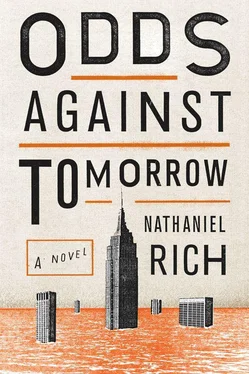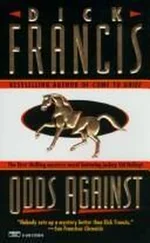When Mitchell entered Sherman’s office he noticed that the caps lock key on the computer of Sherman’s secretary was held down permanently with a thin strip of duct tape. Sherman insisted on giving his two assistants the corner suite; he used the smaller adjacent room, intended for the secretaries, as his personal office on the few days every month that he came in to work. In that room there was space for only a single desk and a folding chair. Sherman invited Mitchell to sit in the chair. Sherman stood in front of the desk, so there was little separation between his crotch and Mitchell’s chin. Mitchell worked in one of the largest buildings in New York City, but he was constantly finding himself sharing miniature spaces with other men.
“Strong work,” said Sherman, pointing to Mitchell’s reports. They were the only papers on his desk. There was also a stopped clock and several paperweights. The desk was a prop. Mitchell sympathized with the desk. But he barely glanced at it, transfixed as he was by Sherman’s head. It was bald and white and as big as a drum, sprayed with red freckles that proliferated in density toward the crown. The effect was not unlike a giant nipple. Despite the fatness of his cranium, Sherman’s center of gravity was low, in his haunches, so that his hips buckled and it seemed as if, at any moment, he were about to spring. Men of Sherman’s stature are often compared to bulldogs, but he reminded Mitchell more of a jaguar — albeit one in captivity, fussed over and overfed. He had that animal’s dangerous, false languor in his eyes, a stare that lulled its object into quiescence before, all of a sudden, it attacked. Sherman saved his fangs for those further up the food chain, but Mitchell still viewed him with the quaking insecurity of a grazing imbecilic herbivore.
“I’m grateful for your efforts regarding this delicate matter,” said Sherman. He absently caressed his belly. “We appreciate it.”
A sudden lightness tickled Mitchell’s brain, and it occurred to him that this might be a good time to ask for his promotion. He told himself to speak. But he didn’t speak.
“You’re quick with numbers. It’s a quality that seems to have gone extinct among today’s graduates. They think that as long as you can punch numbers into a calculator, you’re a mathematician. Not so. And you, Mitchell — you understand that. You show real cleverness in this department.”
“Thank you.” Mitchell’s voice was quick with humiliating eagerness. “I think, given the opportunity, I might display talent in several different departments.”
“I agree. In fact I had another department in mind. Equations and Vectors. We could use you there.”
Mitchell smiled awkwardly, as if posing for a camera that wouldn’t click. The guys in E and V were glorified accountants. Their job was to devise algorithms and formulas to predict complex market activities and the rate of return on various investments. Even his DEAD colleagues seemed lively compared with the forsaken souls in E and V. They were the nerds of the quant world. Which was saying something.
“Actually,” said Mitchell, the words coming too quickly now, “I was hoping that you might consider me for Risk.”
Sherman smiled generously, as if indicating that he would be so good as to pretend Mitchell had never raised the subject.
“Or—” Mitchell stammered, “there’s another idea I was considering. I’ve been approached by a risk consulting firm called FutureWorld. Given my experience with the evaluation project, I thought I could serve as a liaison. You see, they’ve worked out a new kind of business model. It’s quite ingenious—”
Sherman, wincing with confusion at this sudden barrage, silenced Mitchell with a firm nod.
“Risk requires a certain social, ah, aspect that I’m sure is beneath you,” said Sherman. “We tend to give those jobs to former college athletes — you know, big men on campus. Those jobs require salesmanship. Large personalities, camaraderie, wooing. Sure, they have to handle some quantitative analysis, basic stochastics and econometrics, but nothing more advanced than that. A brain like yours is better suited to pure statistical work. You know, the mathematics that are too tricky for computers. Delta-gamma approximations, Monte Carlo simulations, Hull-White, Cox-Ingersoll-Ross, Heath-Jarrow-Morton, whatever else those boys do behind the curtain. Frankly I don’t understand half that crap, but I’m told it’s a hell of an exciting field.”
Sherman paused, his eyebrows flexing like caterpillars. Mitchell was reminded of the cockroaches, which happened to be furiously incubating in his gut that moment.
What’s your secret, Elsa Bruner? Why aren’t you afraid? What do you know that I don’t?
“This is between us,” said Sherman, “and I wouldn’t admit it to the frat boys. But I envy you. You quants — it’s like you have your own secret society. A secret language and a secret world. And it’s all up here.”
Sherman pointed to his own head, which in that instant reflected the fluorescent ceiling light into Mitchell’s eyes.
“Tomorrow you will be shown to your new office.” He seemed to notice the gloom in Mitchell’s face, because he added, “Don’t worry: you won’t even have to change floors.”
Mitchell trudged back to his desk. His nameplate had already been removed from the door. They had placed on the filing cabinet his few personal belongings — a warm can of ginger ale, the postcard from Elsa, and a pair of framed photographs his mother had sent him the day he was hired. In the first photograph he was two years old, bouncing on her lap. Rikki looked concerned. At that age Mitchell was already behaving strangely. He had developed a habit of taking long pauses before speaking — a tic that Rikki blamed on having a nonnative English speaker for a father. It took a speech therapist to explain that Mitchell’s hesitation was not caused by any mental impairment, but by an unusual compulsion to speak in complete sentences. He did not respond to a question until he formulated his answer in his head and mouthed it to himself, making visible lip movements. There were other peculiarities. At three, observing an elder cousin struggle to read from a schoolbook, he glanced at the page and pronounced the first paragraph flawlessly. Seeing the astonished faces around him, he burst into tears.
The second photo was taken less than two miles away, on the steps of the New York Stock Exchange, during the Zukors’ first family trip to the city. Mitchell had been only twelve years old — too young for a hypersensitive child from Overland Park. He’d wanted to visit the aquarium, but his father, old Tibor, commanded the cab to drive straight to Wall Street and Broad. Police barricades, surging citadels of silver glass, pewter-faced men in loosened ties and sweat-damp shirts — Tibor had called the financial district a jungle, but to Mitchell it seemed more like a watch with intricate parts, constantly ticking, ticking. Or was it a time bomb? On a tour of the Stock Exchange, the traders’ urgent sign language and exasperated hectoring were too much. Mitchell covered his ears and the chaos became an insane pantomime, adults playacting like children. When he saw tears in Tibor’s eyes, Mitchell thought that his father must have been similarly affected. But Tibor was moved for a different reason.
“This is where America happens,” said Tibor. “Where we happen.” His passion for old American movies surfaced whenever he found himself overpowered by emotion. “‘Greed is good,’” he said. “ Wall Street , starring a certain Mr. Michael Douglas.” Mitchell had nodded solemnly in agreement.
Tibor felt indebted to Wall Street because he owed his prosperity to a quintessentially American idea. He’d learned as a young man that it was possible to buy cheap residential property with very little money up front, just so long as you could secure, ahead of time, enough tenants who agreed to pay rent in cash. Even more incredible, one could win government funding for this scam, under the premise that each new building would create affordable housing in poor neighborhoods. Slumlords were the foundation of any strong community, Tibor would regularly declaim, though never, to his credit, with sincerity. But now his slums were fading, and so, it seemed, were Tibor and Rikki. Every time Mitchell looked at this photograph he wondered whether his parents were about to enter their own worst-case scenario.
Читать дальше












